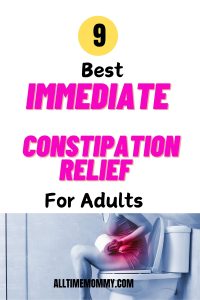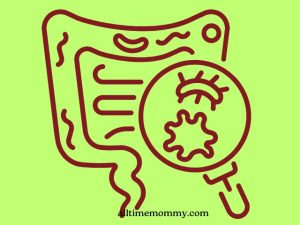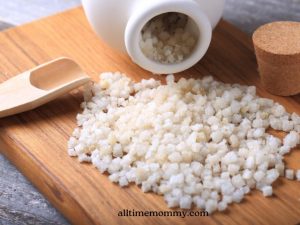Discover quick constipation relief in adults. Do this simple things for immediate constipation relief at home.
Do you sometimes struggle to poop, finding it difficult to consistently pass at least three stools a week?
May be you’re constipation.
You see constipation in adults is quite common. It’s only that many people shy away from talking about it openly.
The most common feeling with constipation is the need to push excessively to pass stool.
Why? because of hard poop.
With constipation, your stool may become hard and dry, often resembling small, pellet-like pieces.
The worst part is, even after a bowel movement, you might feel like not everything has passed. This discomfort can leave you feeling uneasy and wondering what more you can do.
Fortunately, there are several simple yet effective ways to get things moving again.
This blog will explore the best remedies to relieve constipation in adults fast.
After reading this post, you will know how to stimulate your digestive tract so that things move fast and without pain.
But before then,
What Causes Constipation?
Most people constipate because of diet. Dehydration and not eating enough fiber are among the leading cause of constipation in adults. Also, unhealthy gut issues, sedentary life, stress and changes in your routine can contribute to difficulty in bowel movement. Additionally, some research suggests taking certain types of medication may also interfere with your normal pooping routine.
Common Constipation Symptoms
- You may strain while passing stool
- Not having frequent bowel movements, like less than three times a week.
- Passing very hard stool
Affiliate Disclosure: As an Amazon Associate, I get a small commission for purchases made from Amazon.com through links in this post. Learn more about our affiliate disclaimer here.
9 Immediate Constipation Relief Natural Remedies For Adults
1. Warm Lemon Juice Water For Constipation Relief
So far, lemon water is my go-to remedy for constipation relief. According to a study, Lemon water may enhance the liver’s production of bile.
Bile is a digestive enzyme that helps emulsify fats and improve digestion and food movement in your digestive tract.
The acidity of lemon juice can stimulate the production of this digestive enzyme in the stomach to help break down food more efficiently.
Also, lemon juice has a pH similar to stomach acid.
As such, pre-meal intake of lemon water can help maintain healthy stomach acidity, which is crucial for proper digestion.
In fact, another study published in the medical Journal shows that taking lemon water before meals will enhance your peristalsis, helping your system move the food faster.
If you’re suffering from constant constipation without any underlying health issues, you may want to incorporate warm lemon water or lemon tea into your diet to enhance your digestion.
Here is what you need to do.
- One fresh lemon
- 300ml of warm water
Instructions:
- Rinse your lemon thoroughly to remove any dirt.
- Slice the lemon in half, then squeeze the juice into a glass. You can use a lemon squeezer or just your hands.
- Add warm water, about 300ml
- Take it 30 minutes before meals.
2. Raising Your Knees or Squat Pooping Position
A study in The National Library of Medicine suggests the squat pooping position can help alleviate constipation fast.
How?
It improves the natural mechanics of the body for more effective bowel movements.
When you’re in a sitting position (like on a regular toilet), your rectum has a natural kink or bend, which can make it harder for stool to pass.
Raising your knees slightly above to form a squat pooping position can straighten up you rectum.
As such, it creates an appropriate passage which enables your rectum muscles to completely evacuate the stool.
The squatting position increases the pressure in your abdomen and makes it easier to push stool out without excessive straining.
This can prevent issues like hemorrhoids, which often occur from straining during bowel movements.
But,
How Do You Achieve a Squatting Position On a Regular Toilet?
You don’t need to squat on the toilet. You can simulate the benefits by using a squat stool (like a “Squatty Potty”) to achieve a desirable position. As long as you can manage to elevate your knees, you’re good to do your thing.
Get Your 7” Toilet Stool Here
3. Increase Your Intake of Dietary Fiber
Struggling with regular bowel movements? Make soluble and insoluble fiber your go-to solution.
Insoluble fiber, is a form of roughage, consists of the parts of plant foods your body can’t digest or absorb.
It helps alleviate constipation by adding bulk to your stool, while soluble fiber improves stool softness and consistency, making it easier to pass.
As such, having them in your diet will promote the movement of food substances through your digestive system with ease.
The best sources of insoluble fiber are whole fruits, vegetables, nuts and seeds.
Soluble fiber, on the other hand, absorbs water and forms a gel-like paste. This water absorption makes stool soft and improves its consistency.
According to a study, eating soluble fiber like Psyllium can be 3.4 times more effective at relieving constipation than insoluble fiber.
Please note that Psyllium is derived from the seeds of Plantago ovata, a herb which mainly grows in India.
If you want to stop constipation, fast eat;
- Take organic prune juice and dried plums. A study shows that prune juice should considered as a first-line relief for chronic constipation.
- Vegetables (Cooked kale, raw carrots and cooked Brussels sprouts)
- Fruits ( snack on whole fruit like red Apple fresh with skin, fresh Pear, large fresh Kiwifruit, and fresh Raspberries )
- Nuts and seeds (raw almonds, cooked Lentils, cooked black beans, flaxseeds, walnuts and sesame seeds)
- Whole grains (Quinoa (seeds), dry and cooked can do, Oatmeal, and cooked oat bran,)
Get Your Organic Prune Juice Here
4. Hydrate throughout the day.
Water plays a key role in the digestion process. First, it enhances the movement of food through your intestines. Second, it keeps the walls of your intestines smooth, moisturized, and flexible to push digestive substances effectively.
When your body lacks enough water, it prioritizes essential functions and absorbs more water from the intestines. This may lead to dry, hard stool that is difficult to pass.
Remember, dietary fiber requires quite some water to form a soft stool. The less water you consume, the less digestion function will be available.
To be safe;
Drink an adequate amount of water per day without worrying about frequent peeing. Include other liquid foods like soups in your meals. Additionally, eat high water-content fruits like watermelon to help your gastrointestinal system perform better.
Related:
Your Ultimate List Of Healthy Food For Colon (prevents Colon Problems)
14 Surprisingly Simple Ways To Have A Healthy Lifestyle Without Sweating Blood
5. Replenish Your Beneficial Bacteria
According to The National Library of Medicine ,probiotic bacteria are essential for maintaining gut health, preventing infections, and managing various diseases.
But that’s not all—gut bacteria also play a vital role in breaking down food to support efficient digestion.
When there’s an imbalance in gut bacteria (dysbiosis), digestion can slow down, often leading to constipation.
If you’re suffering from constant constipation, you may want to recheck your gut bacteria.
According to a study, taking probiotic supplements with Bifidobacterium species may help with constipation.
How?
Bifidobacterium is a probiotic bacteria which inhabits the gastrointestinal tract.
It may help increase stool frequency and reduce the time taken for food to move through the intestines.
So, what foods increase bifidobacterium?
Eat a lot of fermented food like Sauerkraut and yoghurt products. Also, Foods rich in fibre, such as apples, dates, lentils, blueberries, and Probiotics, can increase the water content in stools, making them softer and easier to pass. This reduces straining and discomfort associated with constipation.
Which Probiotic Strains Help with Constipation?
- Bifidobacterium infantis
- Lactobacillus rhamnosus
- Bifidobacterium lactis
- Lactobacillus acidophilus
Taking a daily probiotic supplement or consuming probiotic-rich foods (like yoghurt, kefir, or fermented foods) can help with regular bowel movements and overall digestive health.
Related:
10 Powerful Cough Remedies For Adults
How To Kill A Sore Throat Fast With Natural Home Remedies
9 Best Toothache Relief Home Remedies That Work Instant
6. Epsom Salt (Magnesium Sulfate)
Most people have found that using Magnesium sulfate can give you quick relief from constipation. Magnesium sulfate, best known as Epsom salt, is an osmotic laxative with a chemical compound that comprises magnesium, sulfur, and oxygen.
Magnesium is a mineral that can act as an osmotic agent.
Another study shows that taking Epsom salt may effectively relieve constipation by increasing bowel motility, which helps alleviate constipation.
What is the best type of Magnesium for Constipation?
- Magnesium Citrate
This is one of the most commonly used forms of magnesium for relieving constipation. It is highly effective at drawing water into the intestines, leading to quick relief.
- Magnesium Hydroxide (Milk of Magnesia)
This is another effective option, often used in over-the-counter laxatives.
- Magnesium Oxide
While less recommended for constipation, it can still help. This form is less soluble and has lower absorption rates than magnesium citrate or hydroxide.
How do you use Epsom salt for constipation?
- Dissolve 2-3 teaspoons (10-30 grams) of Epsom salt in 8 ounces (240 mL) of water.
- Stir and drink the mixture immediately.
- You may add fresh lemon juice for taste.
- Take once a day, preferably on an empty stomach. Do not exceed the dosage as indicated on the package bag because too much Epsom salt may cause bloating and diarrhea.
- Please do not use it for more than one week without consulting your doctor.
This type of Epsom salt can help with bowel movement within 30 minutes to six hours.
Get your High Grade Epsom Salt Here
Related:
7 Best Bloated Stomach Remedies For Instant Relief
13 Best Natural Remedies For Stomach Ulcers
How To Effectively Do a Natural Colon Cleanse At Home
7. Abdominal Massage with Castor Oil or Virgin Olive Oil
Manually massaging the colon can be one of the best constipation remedies for adults, especially if your constipation is caused by the slow movement of stool through the colon.
Why? Because it stimulates the bowel movement quite fast.
While it’s easily done without any oil, studies prove that incorporating certain oils, such as castor oil or olive oil, may enhance this process and make bowel movements much faster.
According to this research, abdominal massage with extra virgin olive oil can be an effective method for treating constipation in adults.
Similarly, castor oil is a stimulant laxative. Research suggests that this ancient oil contains ricinoleic acid, which makes it a natural laxative.
Massaging it on your abdomen can stimulate the gastrointestinal walls to contract and push stool out.
How to Perform Abdominal Massage with castor oil or olive oil
- Take a small bottle of your preferred bottle and put in warm water for a few minutes before rubbing it on your hands.
- Lie on your back in a comfortable position.
- Use your three middle fingers to gently massage the oil onto your abdomen.
- Pay special attention to the colon, where waste collects before expulsion.
- Move in a clockwise direction, starting from the lower right side of your abdomen, moving up, across to the left, and down.
- Massage for 10-15 minutes, or until relaxed. This can be done once or twice daily if necessary.
- After the massage, you may place a warm towel or heating pad over your abdomen for additional relaxation.
8. Take a Spoonful of Extra Virgin Olive oil
Olive oil is a staple ingredient in the Mediterranean diet, which is linked to healthy living and a lower risk of certain diseases.
According to the Journal of Renal Nutrition, consuming one tablespoon of olive oil can help relieve constipation in adults. Olive oil contains phenolic compounds and a mild laxative effect.
It also has a smooth texture and consistency, which helps lubricate the lining of the intestines. Ensure you’re taking it, preferably in the morning and on an empty stomach.
The lubrication effect makes it easier for stool to pass through the colon, reducing the strain during bowel movements.
Extra virgin olive oil is considered to be the purest because it doesn’t undergo extensive heating and chemical processing.
9. After Meals Stretches
Light exercise after meals can increase blood flow to the digestive system.
Improved circulation helps the gut break down food, absorb nutrients, and move waste more effectively through the intestines.
Make sure you incorporate after-meal stretches like brisk walks, leg ups, and simple household chores like dishwashing. In all you do, never go to bed immediately after meals.
Common Question
What Simple Trick Empties Your Bowels Immediately?
Elevating your feet while pooping is a simple trick that can help empty your bowels immediately. This technique is meant to realign your rectum so the stool is naturally low. Lean forward on the toilet with your forearms resting on your thighs, and your feet raised on a small footstool. Your legs should be slightly apart and you may stay for up to 5-10 minutes or until your bowel has emptied.
What Happens If Constipation Is Left Untreated?
Prolonged constipation may lead to irritable bowel syndromes, Hemorrhoids, and Rectal bleeding. In worst cases you may experience Anal fissures, which entail tearing of skin around the anus.
What are the Constipation Danger Signs?
The most obvious danger sign of constipation is prolonged periods without regular stool movement. If your constipation lasts longer than two weeks without improvement, you may want to visit a professional healthcare provider. Rectal bleeding, abdominal pain, and fever could also be signs of serious gut issues that require medical attention.
DISCLAIMER The information contained in this post is for general information purposes only. I’m not a health practitioner and as such, this information should not be used as a substitute for consultation with your professional service provider.





